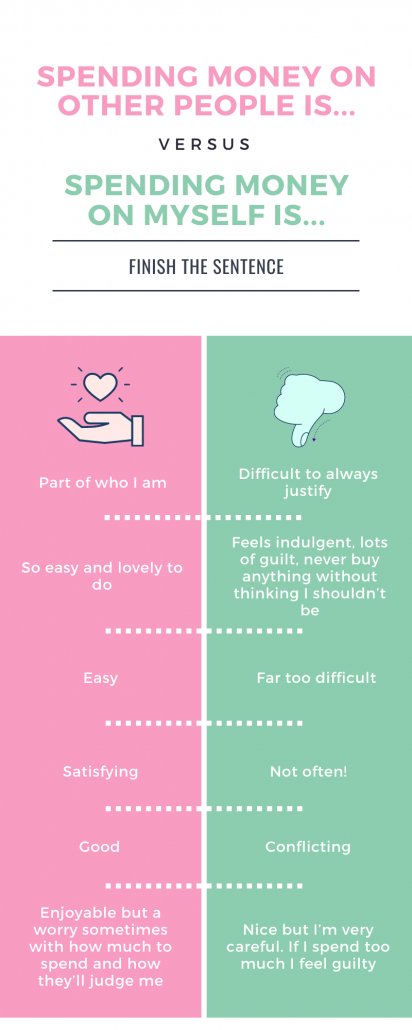When I’m working with clients we look together at different habits and attitudes they may have when it comes to money. A very common habit is “giving”. Giving is an interesting area because on one hand we think we are being generous and it’s a nice thing to buy things for other people, treat other people, be the first to get the drinks in but there is a difference between being generous and being an overgiver. We also need to consider our motivations for being so generous.

WHERE DOES IT ALL GO?
I was working with a client who was super savvy with her money but she just couldn’t work out where all her fun money went, she wasn’t quite getting as much bang for her buck. Following a discussion she then went away and did a bit of reflection on it and it turned out that over 50% of the money was being spent on others. Habits like picking up the first round and often the last, picking up the bill for food, paying for cinema tickets but not asking for the money, not letting others pay when they offered. With that awareness, she was able to make some changes.
Some questions to think about…
- Do you overgive in every relationship?
- Do you feel guilty if someone gives to you?
- Do you put the needs of others before yourself?
- Do you help others even when they do not ask? By giving them money or buying them things?
- Do you find that you give because you want to feel loved or liked?
- Do you think people will only like you if you are generous?
- When someone does something nice for you, do you feel you owe them?
- Do you feel you should pay the bill when eating/drinking out with others?
- Do you spend on others but not yourself?
I sent a short survey to some of my followers and asked them to finish the sentence, these results were really interesting!
I just want to point out that I have been there myself. I was the one picking up the bill for dinner on my credit card, paying for extra rounds of drinks, treating friends to nights out, buying random expensive gifts, not letting others pick up the bill. None of this took me any closer to achieving my financial goals, in fact it was a large factor of my debt and taking me as far away as possible. What I did realise when I worked on my own mindset and habits, was that my true friends would still love me even if I didn’t do all these things. I still do treat my friends but it comes from a totally different place and it’s not to the detriment of my financial goals.
WHAT ARE THE PROBLEMS WITH THIS?
- You feel obligation, you feel like you should
- You feel guilty if you don’t
- You go against your personal boundaries (or you lose touch with what they are)
- You end up people pleasing
- You can feel drained, both monetarily and energetically
- You put your own needs last
- You may end up going into debt or getting no closer to your own financial goals.
- You can often be taken advantage of
- You find it difficult to say no
- You find it difficult to receive
Saturday night cocktails here, Sunday brunch there; sure, you’re happy to cover it. But when history repeats itself and you wind up footing the bill every time you meet up with a particular friend, or worse, loaning friends and relatives bigger chunks of money, things can go downhill, fast—even if your intentions started off good.
Being Too Generous Could Hurt Your Relationships, Karyn Polewaczyk
NEXT STEPS
- Look at why you’re giving/offering
- Start saying no. No is a full sentence, you do not need to explain yourself
- Be kind, but honest
- State boundaries before the bill comes or even before the event. Split the bill or agree to take it in turns (I know my clients will tell you that this is painful to begin with!)
- Pause (And this!)
- Let someone else pay for a change. If someone offers, say thank you (And this!)
- Understand the money messages from your past to determine your habits
- Develop effective communication skills and boundaries
- Ask yourself if your goals reflect your own needs, wants and values or whether you are responding to external “shoulds”
- Before giving money to others, ask yourself if this is actually helping them or getting in the way of developing their own positive money habits
- Write down everything you spend for a month- notice what (and who) you’re spending money on, and how it makes you feel
- Plan to buy one thing or or do one thing for yourself every month
If you want to read a bit more on this, Elizabeth Gilbert, who wrote Eat, Pray, Love, has a great piece here.
